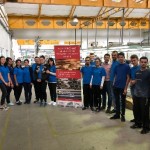Speeches Shim

August 2018 — Emina Subašić is one of 100 unemployed people receiving the chance to learn new skills to get a good job — and stay in Bugojno, in central Bosnia and Herzegovina, where they have family, friends and history. For Subašić, the training has made all the difference.

July 2018 — Senad Santic was only 4 years old when he and his family fled to Sweden from Bosnia and Herzegovina (BiH) in 1993, in the midst of war. Like many other Bosnian diaspora, his family maintained close links to his native city of Mostar, spending most summers there after 1996.
Pit bulls may be dogs of rare courage, but they must be trained to fight. The same requirement applied to Adnan Tulić, who says the specialized training he received through USAID was the best thing that could have happened for his career as a prosecutor — and, it seems, the worst thing for criminals who cross his path, some of whom are now in jail.

The fiscal sector of Bosnia and Herzegovina (BiH) has come a long way since the United States helped restructure the country’s foreign debt right after the war in 1996. But until recently, government institutions relied on outdated manual systems for filing taxes and storing records, involving mounds of paper and waiting in long, slow lines.

USAID works with youth, parents and communities to teach them how to recognize signs of radicalization and extremist messages to prevent them from ever taking root. USAID helps young people at risk of radicalization and other extremist influences to resolve conflicts and overcome obstacles in their lives.


Comment
Make a general inquiry or suggest an improvement.